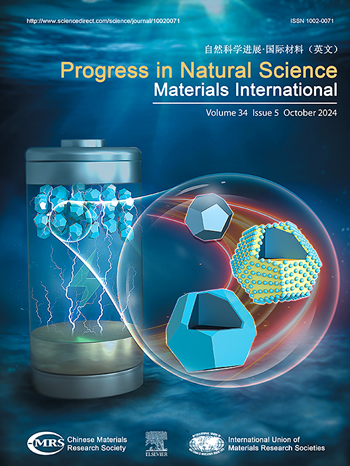具有不同预沉积微观结构的 2195 Al-Li 合金的热变形行为和动态再结晶
IF 4.8
2区 材料科学
Q2 MATERIALS SCIENCE, MULTIDISCIPLINARY
Progress in Natural Science: Materials International
Pub Date : 2024-10-01
DOI:10.1016/j.pnsc.2024.07.003
引用次数: 0
摘要
在这项研究中,2195 种具有不同析出微观结构的 Al-Li 合金经均匀化处理后分别进行了空气冷却 (AC)、间断冷却 (DC) 和炉冷 (FC),然后在不同温度下进行了热压试验。结果表明,所有试样的流动应力都随温度升高而降低,在相同温度下,AC、DC 和 FC 试样的峰值应力依次降低。对于 FC 试样,由于固溶强化和沉淀强化作用的减弱,粗大的预沉淀物降低了抗变形能力。除了 FC 试样在 520 °C 时由于裂纹释放应力而出现异常软化外,低温下的动态软化明显大于高温下的动态软化。在 370-420 °C时,AC试样的动态软化比其他试样更明显,这是由于动态沉淀和沉淀粗化造成的。此外,在 FC 样品中存在大量的动态再结晶(DRX),而在 AC 和 DC 样品中则没有,尽管它们的析出物在低温下的粗化程度相似。这表明 DRX 与规则排列的沉淀物的颗粒刺激成核机制有关。带状或规则排列的沉淀物将铝基体分成多个封闭单元,阻碍了位错和(亚)晶界运动,从而促进了亚晶粒和 DRX 的形成。本文章由计算机程序翻译,如有差异,请以英文原文为准。
Hot deformation behavior and dynamic recrystallization of 2195 Al–Li alloy with various pre-precipitation microstructures
In this work, 2195 Al–Li alloys with various precipitation microstructures were obtained by homogenization treatment followed by air-cooling (AC), discontinuous cooling (DC), and furnace-cooling (FC), and then tested by hot compression at different temperatures. The results show that the flow stresses of all specimens decrease with temperature and the peak stresses of AC, DC and FC specimens decrease in order at the same temperature. For FC samples, coarse pre-precipitates diminish the deformation resistance due to the reduction of solid solution strengthening and precipitation strengthening. Dynamic softening at low temperatures is significantly greater than that at high temperatures, except for the anomalous softening of the FC specimen at 520 °C due to stress release by cracks. At 370–420 °C, the dynamic softening of the AC specimen is more significant than the other samples, resulting from dynamic precipitation and precipitate coarsening. Furthermore, there is considerable dynamic recrystallization (DRX) in FC samples and not in AC and DC samples, although their precipitates coarsen to similar levels at low temperatures. This suggests that DRX is associated with the particle-stimulated nucleation mechanism by regularly arranged precipitates. The banded or regularly arranged precipitates divide the Al matrix into multiple confined units, hindering dislocations and (sub)grain boundary movement, and thus promoting the development of sub-grains and DRX.
求助全文
通过发布文献求助,成功后即可免费获取论文全文。
去求助
来源期刊
CiteScore
8.60
自引率
2.10%
发文量
2812
审稿时长
49 days
期刊介绍:
Progress in Natural Science: Materials International provides scientists and engineers throughout the world with a central vehicle for the exchange and dissemination of basic theoretical studies and applied research of advanced materials. The emphasis is placed on original research, both analytical and experimental, which is of permanent interest to engineers and scientists, covering all aspects of new materials and technologies, such as, energy and environmental materials; advanced structural materials; advanced transportation materials, functional and electronic materials; nano-scale and amorphous materials; health and biological materials; materials modeling and simulation; materials characterization; and so on. The latest research achievements and innovative papers in basic theoretical studies and applied research of material science will be carefully selected and promptly reported. Thus, the aim of this Journal is to serve the global materials science and technology community with the latest research findings.
As a service to readers, an international bibliography of recent publications in advanced materials is published bimonthly.

 求助内容:
求助内容: 应助结果提醒方式:
应助结果提醒方式:


